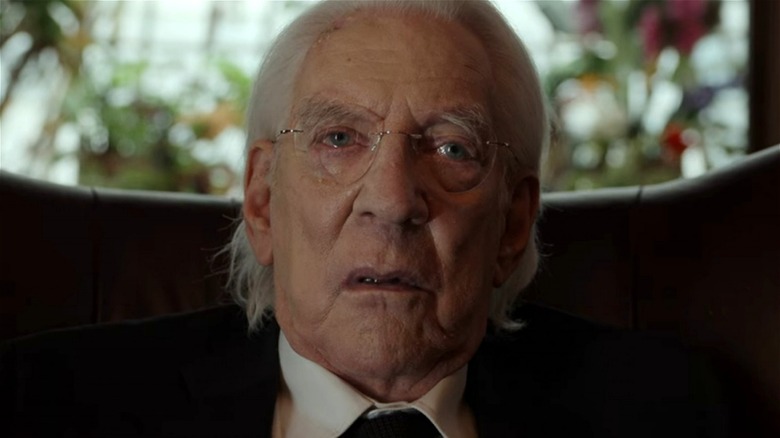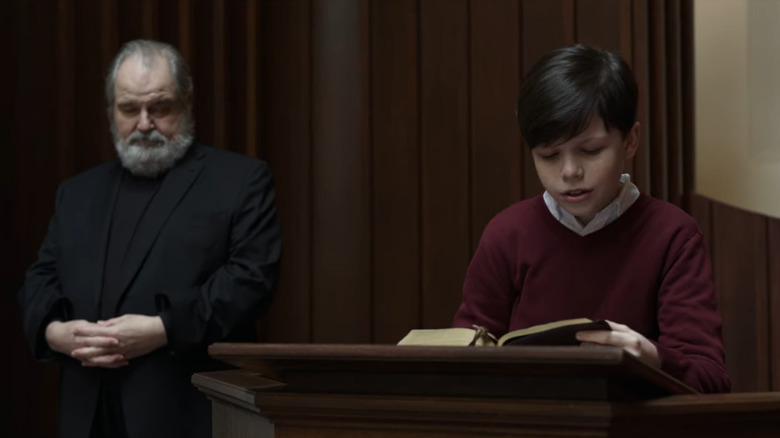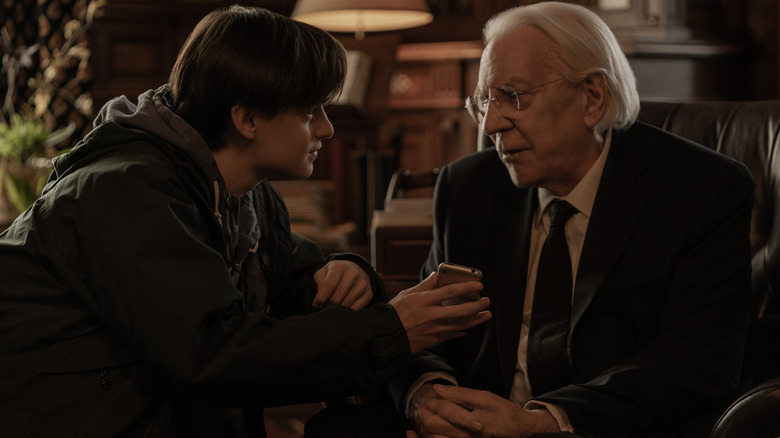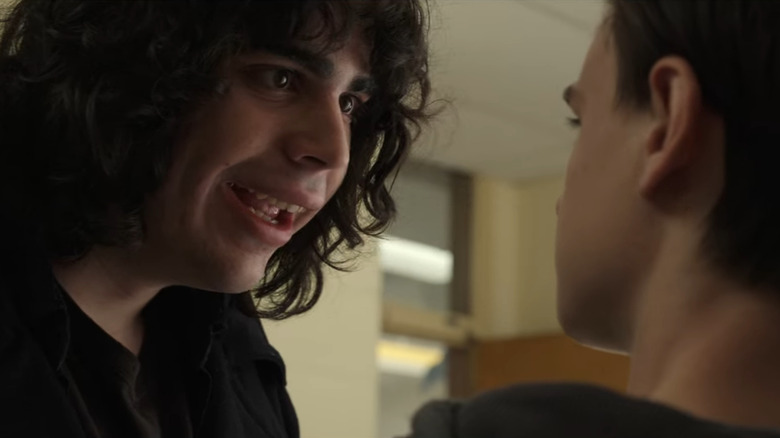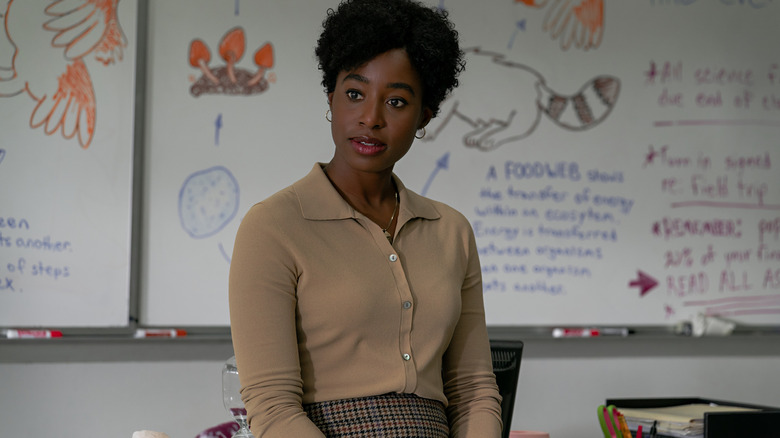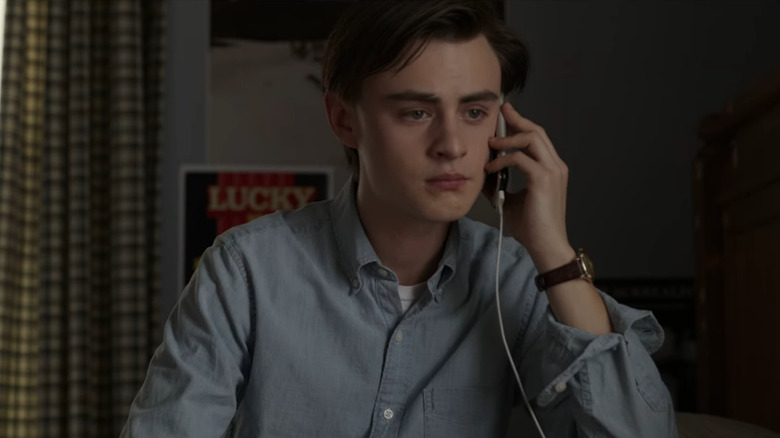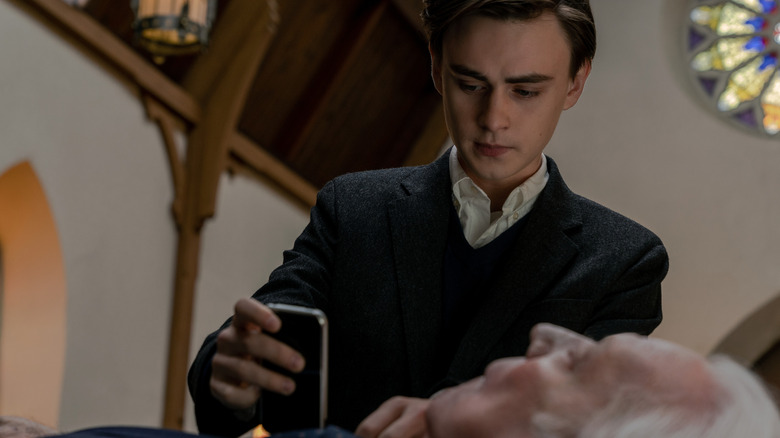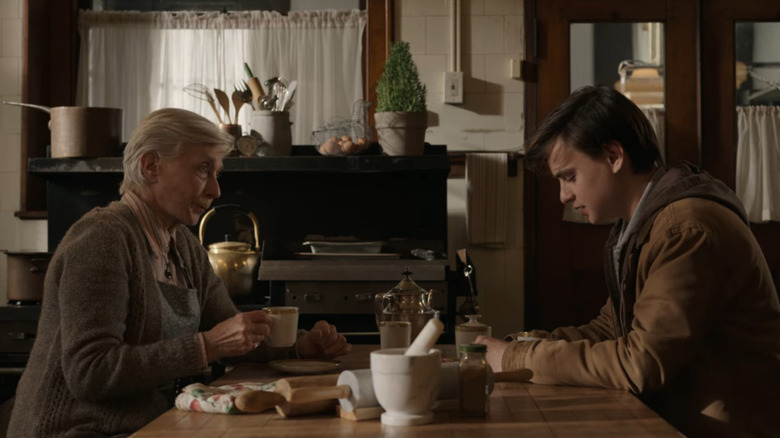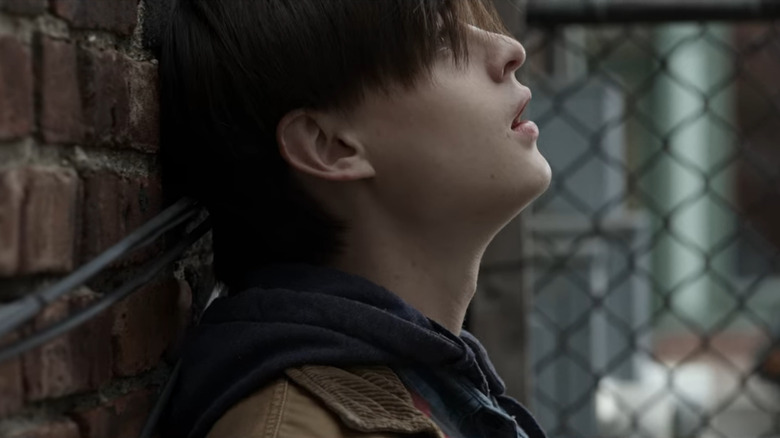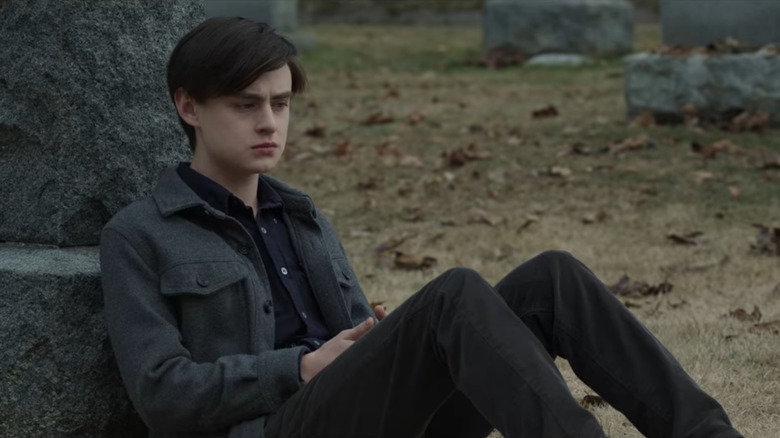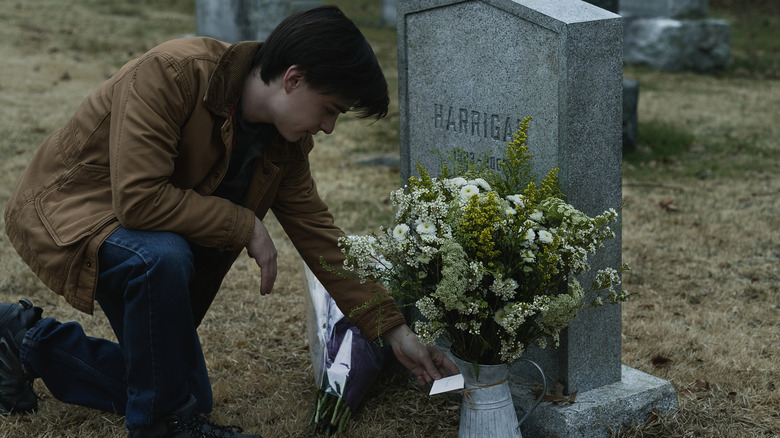The Ending Of Mr. Harrigan's Phone Explained
Contains spoilers for "Mr. Harrigan's Phone"
"Mr. Harrigan's Phone" is a supernatural drama based on a short story by Stephen King. Directed by John Lee Hancock, the film tells the story of Craig (Jaeden Martell), a young boy who reads to a local recluse named Mr. Harrigan (Donald Sutherland) three times a week, forming a kind of friendship that continues after the rich old man passes away. It's a tale of lonely people trying to connect and a parable about the insidious way cell phones and the internet, in general, control our lives.
That being said, it's a fairly subdued film that seems to be more interested in the forging of Craig and Harrigan's friendship rather than the spooky happenings after the elder's demise. This being the case, the film doesn't build to a thrilling conclusion where all the plotlines are neatly tied up and the audience walks away feeling secure in their interpretation of events. Instead, you're left with lingering questions that can haunt you like Mr. Harrigan's strange coded messages.
However, there is a resolution to the film that goes a long way in helping us understand why Craig did the things he did, with hints of a more optimistic (if still uncertain) future for him. Below, we will break down everything that went into that ending to try and help any confused viewers feel a greater sense of closure.
Mr. Harrigan sees Craig read in church
Craig gets the job reading for Mr. Harrigan after the man sees him reading a Bible verse in church. While it's easy to think that he was so impressed by the boy's ability that he just had to hire him to come over and read to him, the actual reason (at least, the way Craig sees it) is a little more complicated and tender than that. Craig accepts the job and begins heading over to Harrigan's big old house three times a week to read books to him since Harrigan's eyesight isn't what it used to be.
Over the course of several years, a bond begins to form. Yes, Harrigan is a little cold and distant, but the more he gets to know Craig, the warmer he becomes. There is an almost grandfatherly relationship going on since they're closer than friends, but Craig doesn't confide in him the way he would a relative. When Harrigan asks Craig why he continues to read to him now that he's in high school, Craig says it's because he enjoys his company.
Given the troubled life Harrigan lived and the enemies he's made in business, it's very likely that Craig is the first person in a long time who genuinely liked him. When you get to be that age and you're living in a lonely house with no one around other than servants, friendship is precious. Hence why Harrigan treasures their connection so much.
Finding a connection
Craig lives in the small (and fictional) town of Harlow in Maine — it is a Stephen King story after all — a place so small that he has to travel to a completely different town every morning to attend high school. He's got some friends who we never really learn much about, he lives with his dad (Joe Tippett), and there's a bit of a silent romance going on in the background between him and a girl at school.
When first arriving in high school, Craig and his friends learn from an older kid that the kind of cell phone you have dictates where you sit in the cafeteria. Everyone wants to sit at the Apple table because the kids with iPhones are considered to be the "cool kids." When Craig gets his first iPhone, he sits at the Apple table and begins texting with the girl he's been crushing on.
We almost never see them communicate verbally — pretty much every word shared between them is done via text. The only person we see conversing with Craig on a regular basis, other than his father, is Harrigan, really selling the idea that these two people are profoundly connected despite being so isolated.
You can't polish a bully
Almost immediately upon arriving at high school, Craig makes an enemy in the form of a bully named Kenny Yankovich (Cyrus Arnold of "8-Bit Christmas" fame). He's an intimidating figure of immense size with wild, black hair framing the almost constant sneer on his face. He tries to get Craig to polish his shoes as a way of asserting his dominance, but Craig manages to avoid this embarrassment and protect his tormentor by telling a teacher that Kenny was just offering him some lunch.
Kenny is so annoyed by Craig that he continues to taunt him without lashing out, until someone rats on him for selling drugs on campus. Assuming Craig was the snitch, Kenny sneaks onto school property during a dance to drag Craig outside and whale on him. Kenny could easily be considered Craig's first enemy, and Harrigan made him promise that he would dispatch enemies quickly.
Since Craig isn't quite as ruthless as Harrigan was in his younger days, he simply goes home and leaves a voicemail for the dead Mr. Harrigan explaining what happened. What started as a therapeutic exercise grows into something menacing when Kenny winds up dead with shoe polish smeared across his mouth. The implication is clear: Harrigan dispatched Kenny for Craig.
Making Craig feel welcome
Craig's hometown is so tiny that the neighboring high school he attends is like an alien world to him, despite it not being all that big. In the midst of learning social norms while trying to dodge the wrath of Kenny Yankovich, Craig is helped by a teacher named Mrs. Hart (Kirby Howell-Baptiste from "The Sandman"). When Kenny first tries getting Craig to polish his shoes, Mrs. Hart is the one to interrupt. When Kenny busts Craig's lip and gives him a black eye, Mrs. Hart helps clean him up.
It's obvious that Craig's fondness for Mrs. Hart doesn't only come from the fact that she seems to be looking out for him, but the film doesn't explore this any further than a single scene where both characters seem to leave certain things unsaid. Whether he has a crush on her or sees her as a mother figure — and whether she knows that or not — isn't the important bit, all that matters is that Craig deeply appreciates her.
So when she is killed in a car accident by a drunk driver, he is understandably distraught. Figuring the ghost of Mr. Harrigan must've killed Kenny after Craig left that voicemail, he leaves another message explaining what happened, and the drunk driver (Craig's second enemy) dies in the shower a few days later with half a bar of soap stuck in his throat and a belly full of shampoo.
Stand by your man
As they spend time together, before Mr. Harrigan's death, he gives Craig some gifts, including many scratch-off lotto tickets. After Craig wins $3,000 from one of them, he decides he wants to buy the old man an iPhone of his own. Harrigan is hesitant at first, but when Craig shows him that he can check the stock market in real time and read the news as it happens, he gets hooked. To help Harrigan decide whether he should answer a call or not, Craig assigns one of the man's favorite songs ("Stand by Your Man" by Tammy Wynette) to his number. Therefore, if Harrigan hears that song, he knows it's Craig.
Craig does the same thing with his phone. Once Harrigan passes away and Craig starts getting messages from his phone, that sentimental ringtone becomes menacing and offputting. It's a fun trick of the filmmakers to take something we associate with Harrigan's softer side and make it ominous, but it also serves as a signal of what exactly is going on here. Although Harrigan has died, he is still looking out for and supporting Craig. He is, to a certain degree, standing by his man ("his man" meaning friend in this case). Every time it rings, it lets Craig know that Harrigan isn't gone — they're still connected, and Craig feels uneasy about what that means.
Craig isn't good with death
Before the events of the film, when Craig was just a little boy, he lost his mother. That loss informs almost everything about his character. His father seems like a kind man who is doing the best he can for his son, but you can tell that he feels a little out of his depth. Craig, likewise, seems like a perfectly nice, well-adjusted kid, but there's a haunted look in his eye that won't go away until he finally says goodbye to his mother.
When Mr. Harrigan dies, Craig appears to take it in stride, but it's eating him up inside. So when everyone leaves the church to head to the cemetery where Harrigan will be buried, Craig takes a moment to slip his phone into his departed friend's pocket. There are likely two reasons for this: the first being that the phone was a symbol of their friendship — a gift given to Harrigan out of the kindness of Craig's heart. The other is that Craig isn't ready to bid him farewell.
Little does he know that by planting the phone in Harrigan's casket, he is keeping the pathways between them open. Had he not done that and allowed the phone to be refurbished and given to someone else instead, then perhaps Harrigan might have rested in peace. As it is, since Craig doesn't know how to handle death, Harrigan exists in a sort of limbo.
The pirate king
Although the Mr. Harrigan that Craig meets is a gentleman who inspired Craig to think deeply about things and introduces him to many great works of literature, the man has a past that Craig is only vaguely aware of. Some of what he knows comes from piecing together details Harrigan shares with him, and the rest comes from a few internet searches.
One glimpse we get into Harrigan's past is a nickname he was given: The Pirate King. The exact context and origin of the name are never fully explained, but we can infer what it means based on how Harrigan talks about business and the fact that he is living a life of self-imposed isolation. During their talks together, Harrigan gives Craig pieces of advice that aren't the kind of things a wise old man usually imparts on young minds in these kinds of films.
He doesn't tell Craig to cherish his family, focus on the little things, and always pursue his dreams — he tells them to dispatch his enemies quickly and often paints a rather bleak worldview. Craig is a nice kid and all, but there is a darkness there that he lets out every so often. This suggests that there may be a part of him that is turning into Harrigan. Therefore, when Craig reveals what he thinks the cryptic messages are saying, it may be Harrigan warning him not to follow in his path.
Mr. Harrigan's secret chamber
Craig is naturally curious about Mr. Harrigan's house, so at one point, he attempts to open a locked door in the reading room. When he is unsuccessful, he asks Harrigan what's in the room. Harrigan responds, "Secrets." This makes one wonder if Harrigan is hiding something nefarious — is he, for instance, some Bluebeard-type old man who keeps the corpses of his victims behind a locked door?
We're never exactly sure what to think of this "Pirate King" thanks to the hazy details regarding his past. He said he moved to Harlow because the views are beautiful but not so beautiful that they attract visitors — and the people here don't ask questions. What we discover by the end of the film is that the deep, dark secret Harrigan keeps hidden from the rest of the world is a loving shrine to the mother he lost as a child.
That's why he chose Craig to read to him; he knew that he was suffering from the same kind of loneliness he experienced himself. It also seems that the reason he considers the shrine to be a terrible secret is that it ruins his image of being a cutthroat, hard-edged businessman. It reminds us that if you pry deep enough into the lives of any filthy rich bully, you will find a wound that will not heal.
Mr. Harrigan sends cryptic texts
After leaving Mr. Harrigan a voicemail, Craig starts getting text messages from him that don't make any sense. Instead of words or phrases, they're simply the letter C a bunch of times and ST. You'd be forgiven for assuming that this was going to be a code to unlock the shrine in Mr. Harrigan's house or something to that effect. In fact, you'd be forgiven for thinking anything because the film never definitively explains what they mean.
In the final moments of the film, Craig sits by Harrigan's grave musing on what he thinks the texts mean, but at no point are his theories confirmed. He believes that the texts are Harrigan asking Craig to stop. Does he want Craig to stop calling him so he can get some sleep? Maybe he wants Craig to stop ignoring his mother's passing and learn to accept the past so he can live a full life. Then again, maybe he wants Craig to stop heading down such a dark path.
It is very likely that Harrigan has learned a lot about life in death and is finally telling Craig to stop chasing ghosts and finally live his life. However, there is also the possibility that Harrigan's phone was hacked and all these texts really are nonsense. Every interpretation is valid because we're never told what they mean either way. Although the evidence does suggest that this is Harrigan asking Craig to move on.
Craig says goodbye
Craig appears to take his interpretation of the text messages to heart because the very next thing we see him doing is visiting his mother's grave for the first time. We learned during Mr. Harrigan's funeral that Craig's dad visits his wife's grave every week, but Craig doesn't have the strength to go. He admits that doing so would be confirming for him that his mother is really gone. And Craig isn't sure he can bear that. So he goes through life trying to ignore the fact, which only makes it more obvious that he is still grieving.
By going to his mother's grave and finally saying goodbye, Craig has freed himself from the undeserved guilt he has been carrying. Not only that, but this hopefully means he will no longer be turning to the ghost of Harrigan to sort out his problems for him. From now on, if someone dies, he will be able to accept this fact with dignity, instead of dialing Harrigan's number in the hopes that the old man's spirit will seek justice. This shows that Craig is growing up and ready to move on to the next stage of his life, however uncertain that future may be.
Bury me with empty pockets
When Mr. Harrigan has a little time with his phone, he points out to Craig that he can't figure out how businesses benefit by making their information available to people for free. As a lifelong, devout capitalist, he just can't wrap his head around it. Then he comes to the conclusion that our phones are gateways to a much darker place, somewhere where the corrupt and powerful can manipulate the masses by lying to them through the free information accessed through their phone.
Later on, Craig concludes that our phones are how we connect to the world. That's why we see so many people sitting near each other without speaking, but communicating with texts — this is the only way they know to connect. Craig feels this is a bad thing because it has confused his understanding of reality. He now lives in a world where the dead can live on through technology or even physically interact with the living thanks to their connection to it through their phone.
That is why, when he throws Mr. Harrigan's phone in the river (finally allowing him to rest), Craig lets us know that when he dies, he plans to be buried with empty pockets. He doesn't want to exist in limbo the way he held onto his mother and Mr. Harrigan. He doesn't want to remain tethered to the world of the living. When he dies, he wants to be truly gone.
